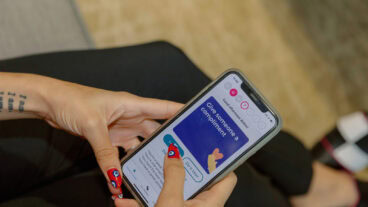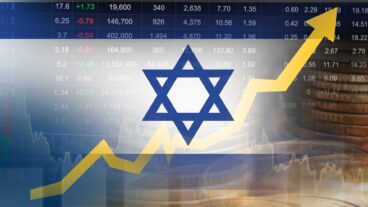The heart of Nemesysco’s security-oriented technology is a signal-processing engine that is said to use more than 8,000 algorithms each time it analyzes an incoming voice waveform.It may sound like a joke from a secret agent television parody like Get Smart or an Austin Powers movie, but the time has arrived for “Voice Analysis Eyeglasses.” And it’s no laughing matter.
The device provides real-time lie detection analysis on the inside of the lenses about whoever is speaking at the time, says its maker, the Israeli company Nemesysco, which developed the technology for counterterrorism and government customers.
Theoretically then, it may not be long before you hear airport security screeners ask, “Do you plan on hijacking this plane?” And they’ll be able to tell immediately whether a passenger is a terrorist by analyzing his answer to that straightforward question.
The technology, developed by mathematician Amir Lieberman at Nemesysco in Zuran, Israel, for military, insurance claim and law enforcement use, is being repackaged and retargeted for personal and corporate applications by V Entertainment (New York). Companies for a wide array of applications such as anti-terrorism, law enforcement, insurance and workers compensation claim assessment are beginning to use variations of the eyeglass technology software which is already available as a downloadable PC program which can analyze live and telephone conversations.
“We’re actually developing two types of glasses – one for security use and one for commercial use,” Lieberman told ISRAEL21c. “A chip inside the glasses is able to read the voice frequency of the person you are talking to. The voice is analyzed through that chip for nine different types of voice analysis and there are lights that indicate whether the person is lying.”
Lieberman says the glasses will be available in the U.S. by June for a price ranging between $500 and $1000.
V Entertainment demonstrated plain sunglasses outfitted with the technology at the 2004 International CES in Las Vegas earlier this month. The system used green, yellow and red color codes to indicate a “true,” “maybe” or “false” response. At its CES booth, V Entertainment analyzed the voices of celebrities like Michael Jackson to determine whether they were lying.
“We’re in the process of deciding whether to offer just one type of glasses – which is limiting fashion-wise or to develop a kit that will connect to almost any glasses,” says Lieberman.
But for security professionals, more important than the fashion aspect is how Lieberman’s breakthrough technology can change security checkpoints. V’s Gatekeeper Security product, GK-1, uses LVA technology to provide an easy-to-use way of clearing people through security checkpoints in less than 30 seconds.
Gatekeeper uses the responses to five ‘yes or no’ pre-scripted questions to provide real-time analysis and signal ‘Green’ for cleared, or ‘Red’ for the need for further questioning.
In an airport or other security setting, LVA provides an accurate and unbiased means of quantifying risk, avoiding both profiling and the wasted resources involved in random
“Truth has a certain parameter, and we are 98 percent accurate in identifying it,” Richard Parton, V’s CEO told Newsweek. Unlike earlier voice-stress-analysis programs, which simply monitored voice frequencies, the company’s “layered voice analysis” software analyzes 129 aspects of sound.
The heart of Nemesysco’s security-oriented technology is a signal-processing engine that is said to use more than 8,000 algorithms each time it analyzes an incoming voice waveform. In this way it detects levels of various emotional states simultaneously from the pitch and speed of the voice.
The law enforcement version achieved about 70 percent accuracy in laboratory trials, according to V Entertainment, and better than 90 percent accuracy against real criminal subjects at a beta test site at the U.S. Air Force’s Rome Laboratories.
“It works off the frequency range of voice patterns,” Parton told the EE Times. This is very different from the more common polygraph, which measures changes in the body, such as heart rate.
With Nemesysco’s technology, a questioner can, for instance, measure your “thinking level” – how much thought you’re giving to your answer. The more you think about it, the more likely it’s not true.
The software measures emotional stress and an “SOS level,” which tells how badly someone doesn’t want to talk about something. It can test for sexual excitement. Speak into a microphone that’s plugged into a laptop, and the software does its work instantly. Separate on-screen boxes track and analyze the different aspects of your voice. At the same time, the software flashes overall conclusions across the top of the screen as you’re talking.
Nemesysco’s patented Poly-Layered Voice Analysis (LVA) measures 18 parameters of speech in real-time for interrogators at police, military and secret-services agencies. According to Nemesysco, its accuracy as a lie detector has proven to be less important than its ability to more quickly pinpoint for interrogators where there are problems in a subject’s story. Officers then can zero in much more quickly with their traditional interrogation techniques.
Already in use by some American law enforcement agencies, the new software is being met with approval. Waupun Wisconsin Police Chief Tom Winscher is using V’s LVA technology.
“The use of this technology in criminal investigations is astounding,”
Winscher told Gizmo.com. Winscher has over 31 years of law enforcement experience, including 25 years teaching interrogation and using the polygraph and other voice analysis technologies. “Not only can you analyze ‘live’ conversations, but you can do a deep analysis of the interview, or do off-line analysis of recorded conversations. This enables law enforcement to focus on areas that require further investigation, saving a great deal of time.”
In another commercial application, the British financial firm HBOS (Halifax and Bank of Scotland) is testing to see if the LVA technology will weed out clients who make fraudulent insurance claims.
The LVA technology measures voice for a variety of parameters including deception, excitement, stress, mental effort, concentration, hesitation, anger, love and lust. It works prerecorded, over the phone and live, the company said. V Entertainment recommends it for screening phone calls, checking the truthfulness of people with whom you deal or gauging romantic interest.
The display can show each measured parameter in a separate window, with real-time traces of instantaneous measurements while flashing the overall for each parameter, such as “false probable,” “high stress” and “SOS.”
Besides lie detection, Dave Watson, chief operating officer of V said the technology “can also measure for other emotions like anxiety, fear or even love.” Indeed V Entertainment offers Pocket PC “love detector” software that can attach to a phone line or work from recorded tapes.
Instead of color-coded LEDs, a bar graph on the display indicates how much the caller to whom you are speaking “loves” you. V Entertainment claims the love detector has demonstrated 96 percent accuracy. Ultimately, the company plans to offer versions of its detectors for cell phones, dating services, teaching aids, toys and games.
Parton says he’s close to closing American deals with a state seeking to detect fraudulent Worker Compensation claims. He’s got other ideas as well. “Someday we can put it on elderly people’s phones,” he says. “When people try to rip them off, our box will disconnect them.”












